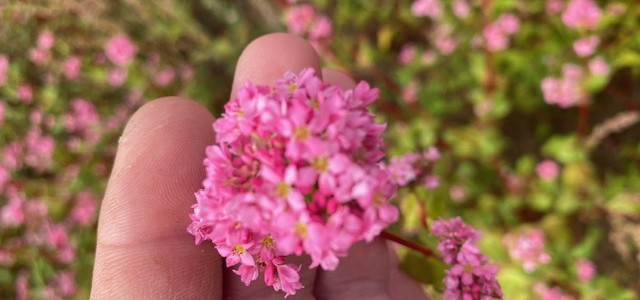-
 Turf Grass Seed Bluegrass, Bentgrass, Ryegrass, Fescues...
Turf Grass Seed Bluegrass, Bentgrass, Ryegrass, Fescues...
-
 Forage Seed Bromes, Clovers, Fescue, Wheatgrass, Legumes
Forage Seed Bromes, Clovers, Fescue, Wheatgrass, Legumes
-
 Grains Wheat Grain, Rye Grain
Grains Wheat Grain, Rye Grain
-
 Cover Crop Seed Buckwheat, Clover, Peas, Ryegrain
Cover Crop Seed Buckwheat, Clover, Peas, Ryegrain
-
 Wildflower Seed Mixtures, Singles, Annual, Perennial
Wildflower Seed Mixtures, Singles, Annual, Perennial
-
 Sprouting Seeds Fully certified Non-GMO Organic seeds for sprouts or microgreens
Sprouting Seeds Fully certified Non-GMO Organic seeds for sprouts or microgreens
Buckwheat Non-GMO Sprouting Seeds
Buckwheat seeds produce sprouts with a light pink stem and dark green leaves. The sprouts can be eaten raw in salads or sandwiches or cooked in stir-fries, soups, or casseroles. They have a mild and nutty flavor that pairs well with various ingredients and can add a crunchy texture to any dish.
Seeding Rate:
Indoor: 8-12 oz./ 10”x 20” tray
Outdoor: 60-80 lbs./acre
How to Grow: Soak seeds overnight before planting. If grown indoors, germinate in darkness for at least two days (until germinated). Sow densely (nearly touching) in moist potting soil at a depth of 1/8” — with temperatures 65°F to 70°F in full sun (or under grow lights). Keep the soil moist, but allow it to drain. As seedlings are growing, gently run a plant stake or your hand over the plants; this will help knock off the seed coats from the cotyledons. Harvest using scissors or sharp knife when the seedlings are about 3-6” tall (about 7-12 days). Cut just above the soil line.
Note: Not well-suited for sprouting jars. Shoots can be stored in a sealed plastic bag in the refrigerator for up to one week. Wash shoots just before eating.
Nutritional Value: Sprouting seeds are richer in protein, folate, magnesium, phosphorus, manganese and vitamins C and K than un-sprouted plants. The vitamin and mineral content varies based on the variety of the sprouting seeds. Sprouts offer a powerful source of vitamins, minerals, antioxidants, and enzymes that fight free radicals because sprouting can increase their potency by 20 times or more.

